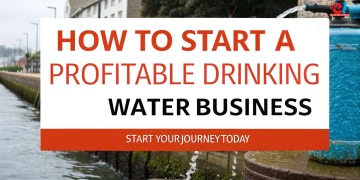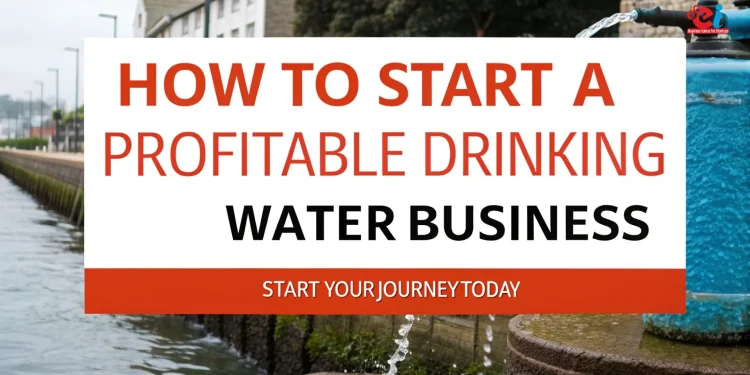Globally, the demand for safe, clean drinking water is increasing due to population growth, urbanization, and increased health awareness. Also, natural water resources are becoming less reliable. The drinking water business is a recession-resistant, scalable opportunity that offers high margins, a large customer base, and can be used by households, offices, retailers, hospitality, rural areas, and urban areas.
This comprehensive guide will walk you through the basics of starting a profitable water business. We’ll cover market potential, business model, manufacturing process, and regulatory considerations.
The Drinking Water Business is Booming
In India and many other developing nations, the tap water can be unreliable when it comes to its purity and availability. The demand for the packaged drinking water business has increased across all income levels. According to a recent market study, India’s packaged water market will grow at a rate of over 10% for the next five year, and surpass INR 400 billion in 2030.
The growth of the drinking water business is driven by urban lifestyles and tourism. It also comes from health-conscious consumers, who choose filtered or bottled water to reduce contamination risks. The market is also evolving into different segments – 20-litre jars are available for homes and offices, 500ml bottles are for travelers and premium water comes in flavored or mineral-enhanced varieties. This variety gives new entrants a wide range of niche options.
Related: How to Start a Manufacturing Business of Flavored Drinking Water
What is the best business model: Bulk, Jars, or Bottles?
Prior to starting your business, you must identify the segment that you are targeting. Each segment has different customer needs, investment models and operational models.
The FMCG and retail sectors are the main consumers of the drinking water business. It is sold in bottles ranging from 200ml to 2 litres. This type of packaging requires a large distribution network and more marketing effort. The 20-litre jars, on the other hand, are better suited to B2B and direct-to-home business models that require recurring deliveries with steady margins. Others focus on bulk supply of water for events, industries, or institutions. This is less brand-focused, but more logistics-driven.
The choice you make should be based on the location of your business, availability of water resources, infrastructure for delivery, and your target audience. Once a brand has established itself in a particular segment, they often diversifies its formats.
Understanding the Manufacturing Process
A well-defined purification and packing process is required to set up a business that sells drinking water and complies with safety and health standards. This is how the main process works:
Raw water can be sourced through boreholes, municipal sources, or springs. The water is then passed through pretreatment filters to remove large particles and turbidity. The water is then passed through (Reverse Osmosis) systems to remove dissolved salts, microbes, and other contaminants. Some cases include UV and ozone treatment to disinfect the water and increase shelf life.
An automated filling machine is used to fill jars and bottles after purification. Capping, labeling and date-coding are all part of the final stage to prepare for shipment. To receive ISI certification in India, the entire process must adhere to BIS (Bureau of Indian Standards).
Regular lab testing is necessary for quality assurance. This includes both the input and output of water. The majority of plants maintain a lab in-house to test batches.
Compliance with Regulatory Requirements and Requirements
To start a packaged water business in India, you will need the approval of several government agencies. BIS Certification (IS:14543) is most important, as it ensures that the water meets national purity and hygienic standards. You will also need:
- FSSAI License for Food Safety Compliance
- Pollution Control Clearance by the State Pollution Control Board
- Registration of factories under local or state laws
- NABL-accredited labs provide water testing reports
Non-compliance with regulations can result in penalties or the closure of your plant. Installing rainwater harvesting units and sustainable wastewater treatment systems can be an advantage during CSR branding and inspections.
Related: The Future of Bottled Water Manufacturing
Plant Layout and Machine Planning
The layout of your factory depends on how large you want to make it and what SKUs (stock-keeping units) will be produced. The key areas are:
- Zone for raw water storage and pumping
- Filtration zone
- The UV and RO sterilization areas
- Cleaning the zone before filling and sealing
- Labeling and packaging unit
- Section of storage and dispatch
The essential machinery includes water purification systems (with RO and UV filters), bottle blowing, filling, capping, shrink packaging, and lab equipment.
Maintaining the separation of clean and unclean zones is essential. Proper ventilation and the use of food-grade materials for piping and storage are also important. An efficient layout reduces production times, minimizes contamination risks, and ensures food safety standards.
Market Strategy: Branding, Distribution & Customer Retention
In the drinking water business, customer trust is paramount. Customers want to know that the water is safe, pure, and handled hygienically. Even small local brands are investing in branding to create a strong image. This includes clean packaging, tamper-proof seals, certifications of hygiene, and responsive customer service.
A solid distribution strategy will be key for B2C businesses selling bottled water. You will need to establish relationships with wholesalers and retailers as well as supermarkets, restaurants and online marketplaces. Retailers will push your product if they have a consistent supply, timely deliveries, and attractive margins.
If you are supplying 20-litre bottles to offices and homes, a recurring model can be built through direct sales or app-based bookings. This will increase customer retention. To grow their customer base, many startups offer subscription-based delivery of water, discounts on bulk purchases, or loyalty rewards.
Growth Outlook: Drivers of Demand and Emerging Trends
The demand for safe drinking water is only going to increase as environmental concerns and temperatures rise. Tier-2 cities will remain strong, but they are also untapped goldmines for institutional sales and jar supply.
There is a growing demand for water with added value, such as alkaline water or water enhanced with minerals, or water that has been flavored. Startups are adopting smart packaging such as reusable containers or eco-friendly bottles to differentiate themselves in the market.
Through initiatives such as “Jal Jeevan Mission”, the government is increasing awareness of water safety and indirectly supporting the industry by increasing demand.
For more information check out this video
Challenges You Should Prepare for
Running a drinking-water business is not easy, despite the high demand. Scarcity of raw water, Power Outages and Fluctuations in Packaging Material Costs are all factors that can impact production.
violations relating to hygiene, waste management, or labelling may also result in a shutdown. Continuous investment in quality assurance, automation and regulatory training are therefore essential.
Retail pricing strategies may be affected by the competition from large brands such as Bisleri, Aquafina and Kinley, but local branding, customer relationships and smaller players can thrive in certain regions.
Last Words: Are You the right business for you?
The drinking water business can be a worthwhile venture if you’re looking for a viable business with recurring demands, a low entry barrier, and scalability potential. You can make this vital utility profitable with the right purification technologies, process control and branding strategies.
In this business, quality and trust equals growth. Startups can create lasting brands by prioritizing hygiene, customer convenience and health.
Which business to start? How to choose a business idea?
How NPCS can help you succeed
Niir Consultancy Services helps aspiring entrepreneurs launch successful industrial ventures. We provide Market Surveys and Detailed Techno-Economic Feasibility Reports, which include:
- The entire manufacturing technology and process
- Raw Material and Machinery Requirements
- Plant layouts, quality standards, and market analysis
The NPCS report is your guide to assessing the technical and financial feasibility for setting up a water business, or any other industry project.


















